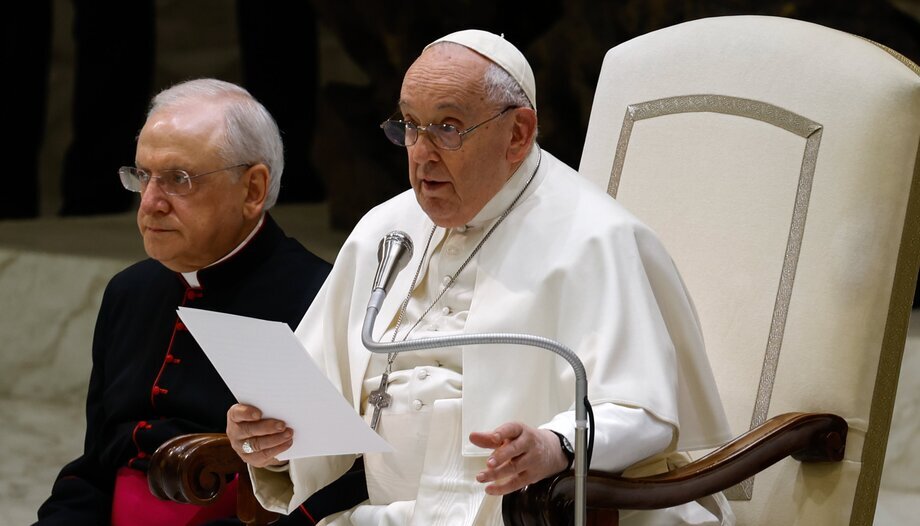During today's audience in the Paul VI Hall, the Pope continued the cycle of catechesis The theme of the meeting was "Vices and Virtues", and he focused his reflection on the theme "Envy and vainglory", with a reading from a letter of St. Paul (Gal 5:24-26).
"Envy appears from the very first pages of the Bible. When we read the story of Cain and Abel we see that, moved by envy, Cain even went so far as to kill his younger brother," because "envy, if not controlled, leads to hatred of the other," the Pope pointed out, continuing with some flu-like symptomsFilippo Ciampanelli, an ecclesiastic from the Secretariat of State, read your wordsexcept for the final address in Italian and the blessing.
"The envious person seeks the evil of the other, not only out of hatred, but in reality he would like to be like him. At the base of this vice is the false idea that God must act according to worldly logic, yet the divine logic is love and gratuitousness," he continued, as can be seen in the parable of those who go to work in the vineyard.
Vanity, instrumental relationships
The vaingloryThe Pope went on to say, "He who boasts - the vain, the conceited - is self-centered and constantly demands attention. "The one who boasts - the vain, the conceited - is self-centered and constantly clamors for attention. In his relations with others he has no empathy and does not consider them as equals. He tends to instrumentalize everything and everyone in order to achieve his ambitions".
The relationships of the vain person "are always instrumental, marked by the arrogance of the other. His person, his achievements, his successes must be exhibited to everyone: he is a perpetual beggar for attention. And if sometimes his qualities are not recognized, he gets fiercely angry. Others are unfair, they don't understand, they don't measure up," the Pope said.
Looking to St. Paul
"To cure the vain, the spiritual teachers do not suggest many remedies. For, after all, the evil of vanity has its remedy in itself: the praise that the vain person hoped to reap from the world will soon turn against him. How many people, deceived by a false self-image, have later fallen into sins of which they would soon be ashamed!" explained Francis.
The most beautiful instruction for overcoming vainglory is found in the testimony of St. Paul. has concluded. "The Apostle was always faced with a defect that he could never overcome. Three times he asked the Lord to deliver him from that torment, but in the end Jesus answered him: 'My grace is sufficient for you; strength is made perfect in weakness.' From that day on, Paul was set free. And his conclusion should also be ours: "I glory in my weaknesses, so that the strength of Christ may dwell in me.
"May the Lenten journey be an opportunity to return to oneself and renew one's spirit," he said at the end of his reflection.
In his greeting to the Spanish-speaking pilgrims, Francis advised that "it would do us good during this Lent to meditate frequently on the "Litany of Humility" of Cardinal Merry del Val, in order to combat the vices that keep us away from life in Christ".
Landmines, wars, Burkina Faso, Burkina Faso
In his concluding remarks, the Holy Father recalled the 25th anniversary of the entry into force of the Convention, on March 1, on the prohibition of anti-personnel mines, which continue to affect innocent civilians, especially children, many years after the end of hostilities.
"I express my condolences to the many victims of these artillery devices, which remind us of the dramatic cruelty of wars and the price that the civilian population is forced to suffer. In this regard, I thank all those who offer their contribution to assisting the victims and cleaning up the contaminated areas. Their work is a concrete response to the universal call to be peacemakers, caring for our brothers and sisters."
"Let us not forget the peoples who suffer because of war: Ukraine, Palestine, Israel and many others," he concluded. "And let us pray for the victims of the recent attacks on places of worship in Burkina Faso; as well as for the people of Haiti, where crimes and kidnappings by armed gangs continue. To all, my blessing!".
After the blessing, the Pope greeted some ecclesiastics, including Monsignor Luis Argüello, Archbishop of Valladolid, who had planned to ask the Holy Father this morning, together with the Commission of the Holy Father, for the blessing of the Holy Father. Elizabeth the Catholicthe impetus for the beatification of the Spanish sovereign.








